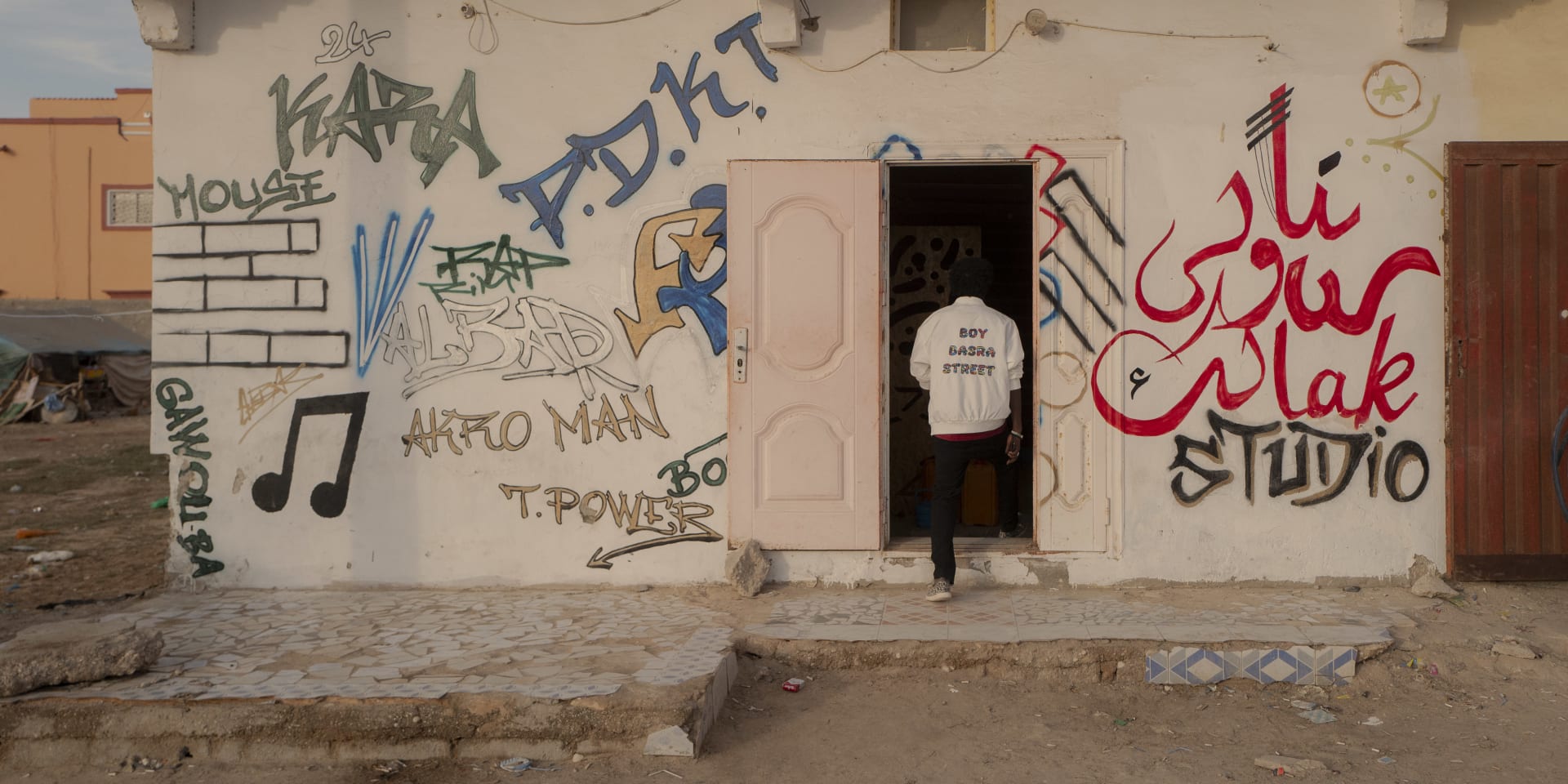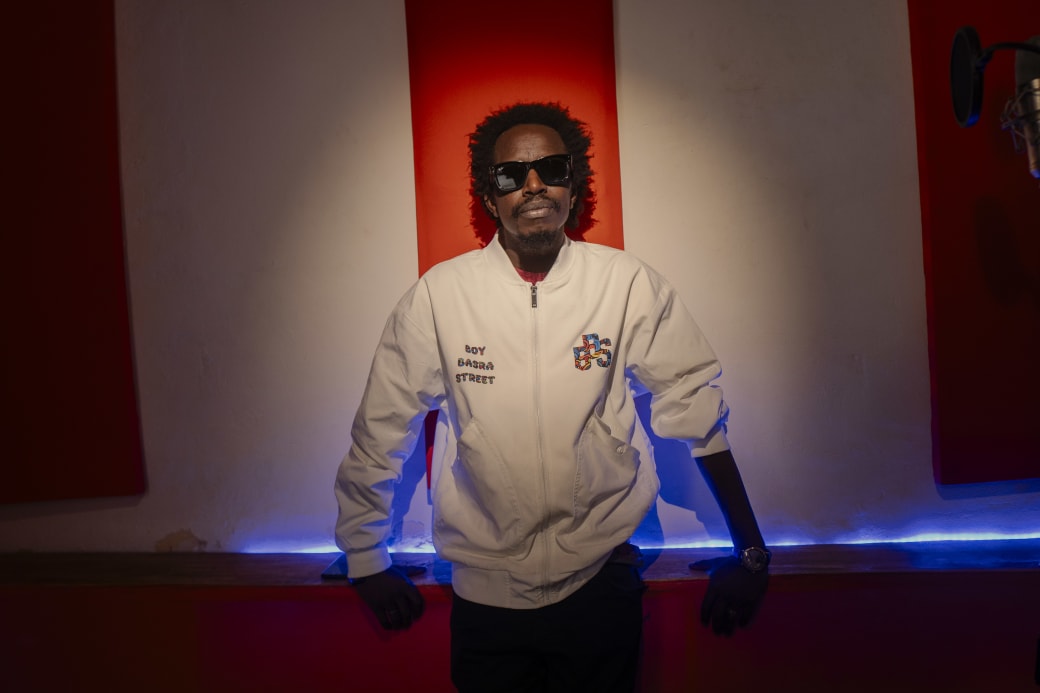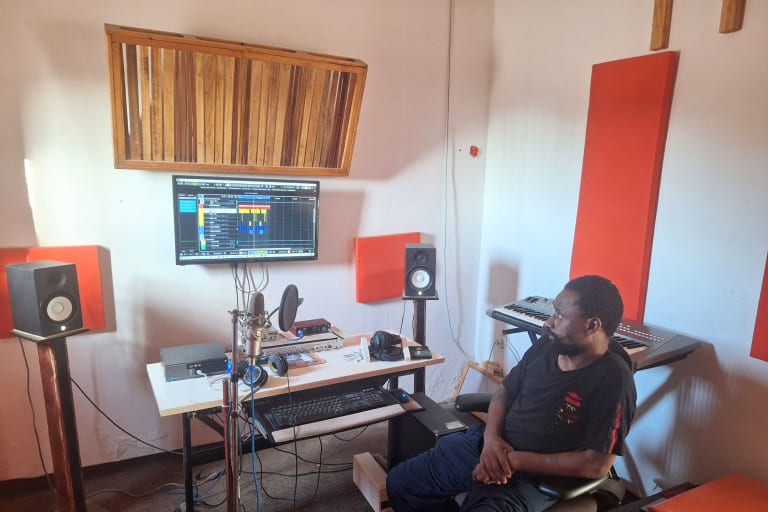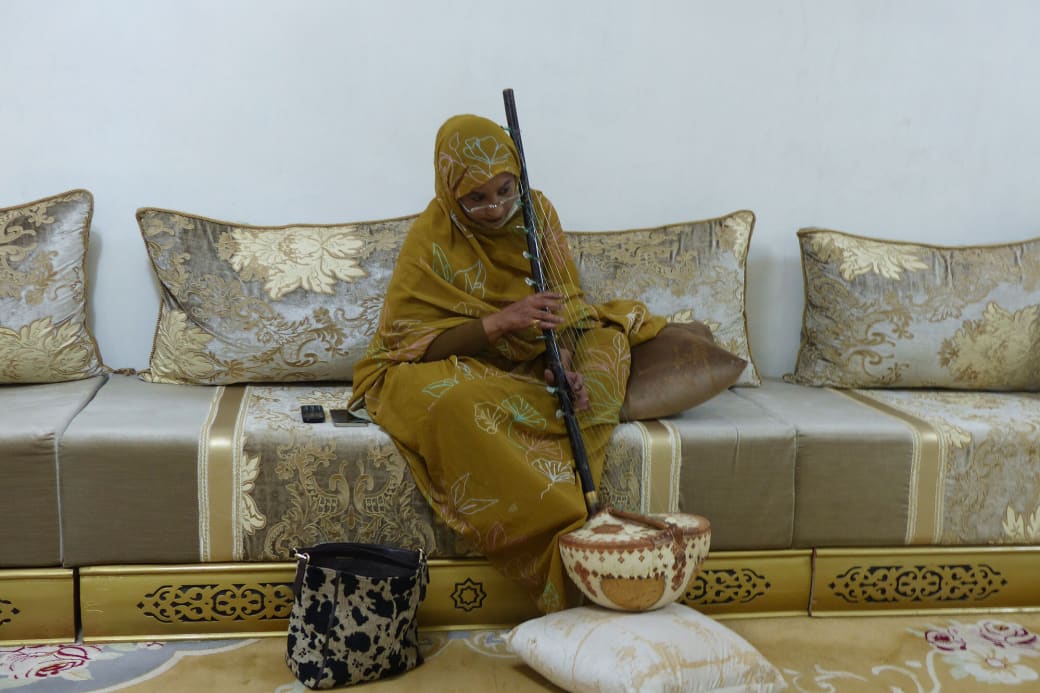Music as national memory
In Mauritania, both traditional and modern music is of social importance

© Michele Cattani

© Michele Cattani
28 April 2025 • 13 minutes reading time
For traditional Moorish groups in Mauritania, music is a family affair of renowned artists, often with a social message. But young people from other ethnic groups and poorer neighbourhoods have little connection with it. Hip-hop is their alternative. ‘For us, this is not a tradition, it is our profession. And we are determined.’
Mauritania: The jihadi-free exception
In the Sahel, Mauritania is the only country spared from jihadist incursions and large-scale violence. The contrast with neighbouring Mali is huge. There, war between Tuareg rebels and the government has been raging for almost 13 years. In four reports, we outline how Mauritania is trying to build a dam against rising jihadism and the spiral of violence.
This is episode 4: In Mauritania, both traditional and modern music is of social importance
This article was translated from Dutch by kompreno, which provides high-quality, distraction-free journalism in five languages. Partner of the European Press Prize, kompreno curates top stories from 30+ sources across 15 European countries. Join here to support independent journalism.
From the threshold of a shop, a group of young people stare at the cars racing past. We are on the busy Gamal Abdel Nasser boulevard in Nouakchott, Mauritania’s capital. The young people are wearing sunglasses and loose necklaces. Occasionally a car stops. This is followed by hugs and fists in greeting. In the shop space behind them, among the colourful clothes, are a few seats from where you can observe the passers-by perfectly.
‘This is our base of operations. This is where we meet other rappers or breakdancers. Everyone knows they can find me here’, says Mickey Diallo. At the beginning of this century, Diallo himself was active as a rapper, but now he is mainly president of the Association for Urban Culture. His next big project is to finally create a ‘House of Urban Culture’, where artists can seek out and support each other.
‘There are so many talented beatmakers and rappers running in these neighbourhoods, but the resources are lacking.’ With his bottle of water in hand, Diallo suddenly points across the boulevard. ‘That’s Nouakchott 1, that’s where the money is. I myself hardly get there. With my frizzy hair and trainers, I don’t belong there.’
Then he folds his arm and points down. ‘This is Nouakchott 2. Here the houses are built close together, there is poverty and the police squeeze us. In the past, I used to denounce this injustice in my rap lyrics, but I stopped doing that. I don’t want to torpedo the projects of the association and young artists.’
Despite limited freedom of expression, music remains an important means of expression in Mauritania. Especially for young people in working-class neighbourhoods. They often belong to disadvantaged ethnic groups, such as the Peul, the Soninke and the Haratin or black Moors, which are the descendants of former slaves.
Those groups are still overrepresented in poverty and crime rates. Their vulnerable social position also makes them the most susceptible to jihadist groups. Positions of power mostly remain in the hands of the white Moors, the Beidan.
In Mauritania, the diverse musical landscape reflects these social differences. Yet both traditional Moorish styles and contemporary hip-hop offer a megaphone to denounce social and racial injustice.

Mickey Diallo in his studio.
© Michele Cattani
Creating awareness
‘For us, music is a weapon against ignorance’, Nevissa Baba Cheyakh says in the same apt tone with which she leaves me no choice not to have dinner with her family moments later. Even in the residential areas of the capital, having pizza delivered at a midnight hour is a convenient solution.
Like so many Moorish performers, Baba Cheyakh’s family belongs to the tribe of the Iggawen, which plays a similar social role to the griots. These itinerant musicians convey social messages in their lyrics and have traditionally played an important role in society in the Sahel.
‘There are hardly any archives in Mauritania’, says Baba Cheyakh. ‘And those on television are regularly "cleared". Events like the nationalisation of the French mining company or the war against Senegal in ‘89 live on in public memory only because songs about them exist. Music is the only national memory we have.’
Because of their fame, artists in Mauritania are also the people of choice to raise awareness. ‘Our lyrics can create awareness. Songs about HIV, for example, can inform people about its dangers.’
But according to Baba Cheyakh, you can’t just do anything in the process. ‘In traditional Moorish music, there are some basic principles such as starting a song with a warrior verse. Basically, it’s like jazz. There are rules and it’s up to the musician to use them creatively.’ Although those rules are certainly no simpler than in other styles of music.

© Thibault Coigniez
Family traditions with electric guitars
‘Oh, Moorish music is extremely sophisticated’, emphasises Intagrist el Ansari as we sit on a terrace of a Moroccan café on a balmy Sunday evening. As a journalist, el Ansari wrote several articles on Moorish traditional music. He himself comes from the city of Timbuktu in Mali, where he lived and worked until war broke out in 2012. So he can compare the differences and similarities between Moorish and Malian music like no other.
El Ansari explains, for example, how the different peoples in the region use the traditional stringed instrument the tidinit. ‘The Bambara in Mali just tell a story with it. Among the Tuaregs in Mali, the griot sings, but in Mauritania, the griot easily sings for half an hour over one and the same poem.’
In addition, el Ansari emphasises the difference in musical culture. ‘In Mali you have concerts and festivals, while here musicians mainly perform at wedding parties. Here in Mauritania, there is still the attachment to a family context. So often the lyrics deal with matters within the main genders. Their political power may have shrunk considerably since colonisation, but those customs persist to this day.’
(The article continues after our reading tips)
‘Our mother modernized Sahara music and laid the foundation for modern genres such as desert blues.’Tahra Ahl Nana
That importance of family traditions is also evident when, a few days later, I am sitting under a giant tent canvas drinking tea in the Ahl Nana sisters’ garden. ‘Our mother modernised Saharan music with all kinds of new influences and instruments like the electric guitar. She laid the foundation for modern genres like the desert blues’, Tahra Ahl Nana explains.
Surrounded by three daughters, Tahra exuberantly recounts how they were allowed to perform for the royal families of Saudi Arabia and Morocco. In the Arab world, therefore, the family name ‘Ahl Nana’ is extremely renowned.
‘Our great-great-great-grandfather once left for the Hodh el Chargui region on the border with Mali. From there, he brought the tidinit to Mauritania. In turn, our mum was born in Timbuktu, where she soon came into contact with the rich musical styles of that booming trading city. Timbuktu still holds a special place in our hearts.’
That the ties between Mauritania and Mali are still close was also evident during my meeting with el Ansari, when his cousin Illiy joined the table a little later. Illyi works as a manager at Ain Farba, an international festival of art and culture that takes place every December in the Hodh el Gharbi region, in the south-east of the country. It is closely linked to the Festival au Désert, which used to be held in Timbuktu. Since the war and the presence of jihadist groups, the festival has gone into exile to Morocco and Mauritania.
‘We want to affirm the brotherhood between the Malian and Mauritanian people’, Illiy says with endearing enthusiasm. Nor was the location chosen by chance. ‘The village of Aïn Farba is right in the middle between Nouakchott and the Malian capital Bamako. We always welcome half Mauritanian and half Malian artists.’
As refugees from Timbuktu, Illiy and his brother ended up in the Mberra refugee camp themselves. Thanks to a study programme offered by the Mauritanian government, his brother was able to pursue a degree in management at the University of Nouakchott.
At the end of the evening, Illiy hands over the number to Brahim Ould Cheikh Ahmed, the manager of the festival. ‘Brahim knows the whole musical scene of Nouakchott. I’m sure he will want to take you on a tour sometime.’
Lees hier het volledige dossier over Mauritanië
Singing in a golden salon
A week later, I find myself waiting at a roundabout at 11pm. On the phone, Ould Cheikh Ahmed had stressed that there was little point in meeting up earlier in the evening. In Mauritania too, artists are night owls.
When I quietly fear I will miss him in the swarm of passing cars and mopeds, a white SUV stops. ‘Get in, we are going to visit Ouleya Amar Tichit, the diva of Mauritanian music.’
Our trip ends in Tevragh-Zeina, one of Nouakchott’s more residential neighbourhoods. Here, too, you see trash and tent cloths on the streets, but lined up in the open space between walled villas. At one of these villas, we go inside. We take a seat in a lounge where gold cushions decorate the benches against the wall.
After half an hour, Amar Tichit walks in and soon has her beloved stringed instrument the Ardîn brought to her. As she plays the strings, she pays tribute to Allah with sounds that come high, sharp, then deep from the throat again.
A little later, she calls in her son. With slight reluctance, he puts himself at her feet and taps a rhythm on the Ardîn’s gourd. His mother starts a second song.
Listen here to an exclusive excerpt from Ouleya Amar Tichit
Suddenly she stops. ‘C’est bon? No more questions?’ She says goodbye and walks away. That night, Amar Tichit has other musical commitments. Less than an hour after arriving, Ould Cheikh Ahmed’s white SUV is already driving past the villas. Nothing suggests that in a few days I would be driving along the same road in a taxi to Diallo’s little shop. It is in a neighbourhood a few hundred metres away, but it seems like another world. It is Nouakchott 2.

Ouleya Amar Tichit, de diva van de Mauritaanse muziek.
© Thibault Coigniez
State prefers violence to education
‘That Moorish music is nothing for us. We are totally out of touch with that world of life’, Diallo says in a resigned tone. We walk from the shop to the studio a bit further down the road. When we arrive, he is already a lot more in his element and greets the three artists present who take a tea break in the vestibule between recordings. One of the three has Free as his stage name and enthrones me into the studio space.
‘Listen, I made this mixtape today. I used to be more into reggae, but now I’m moving towards hip-hop’, Free tells me from the studio chair. Hailing from Guinea, he raps in both Fula, his mother tongue, and French, as he wants everyone to understand his message.
‘In this song, I empathised with someone who wants to cross to Europe in a boat. That was not obvious, because I think such a crossing is pure madness. But as long as ambitious young people in Guinea and Mauritania walk up the walls, they will continue to leave.’
Diallo also sees how the lack of jobs and opportunities is driving young people in Nouakchott 2 towards crime. ‘If you have work, you are not going to stab someone with a knife. But instead of rolling out learning centres, the government is building a commissariat in every neighbourhood. The state prefers violence to education.’
‘In these districts, the youths become entrepreneurs out of necessity. They soon understand that they cannot wait for the government to make something of their lives. We cannot let that perseverance and the will to succeed go to waste.’
Free proudly reveals how, in another song, he calls on his Guinean contemporaries not to give up despite all the difficulties. ‘You have to forge ahead and seize opportunities yourself. I want to lead by example by shaping my musical dreams a little more every day here.’ Free’s dreams are already somewhat more likely to succeed because he has access to a professionally equipped studio.
To provide those resources to new young people as well, establishing the urban culture house is a priority for Mickey Diallo. ‘Once young people have the resources and receive the necessary education, then you will see something. Music is already alive here, but now we need to be able to make a living from it. For us, this is not a hobby or traditional family event. It is our profession and we are determined to make a living out of it as well.’
 This article was translated from Dutch by kompreno, which provides high-quality, distraction-free journalism in five languages. Partner of the European Press Prize, kompreno curates top stories from 30+ sources across 15 European countries. Join here to support independent journalism.
This article was translated from Dutch by kompreno, which provides high-quality, distraction-free journalism in five languages. Partner of the European Press Prize, kompreno curates top stories from 30+ sources across 15 European countries. Join here to support independent journalism.
The translation is AI-assisted. The original article remains the final version. Despite our efforts to ensure accuracy, some nuances of the original text may not be fully reproduced.

This article was created with the support of the Pascal Decroos Fund for Special Journalism
If you are proMO*...
Most of our work is published in Dutch, as a proMO* you will receive mainly Dutch content. That said we are constantly working to improve our translated work. You are always welcome to support us both as a proMO* or by supporting us with a donation. Want to know more? Contact us at promo@mo.be.
You help us grow and ensure that we can spread all our stories for free. You receive MO*Magazine and extra editions four times a year.
You are welcome at our events free of charge and have a chance to win free tickets for concerts, films, festivals and exhibitions.
You can enter into a dialogue with our journalists via a separate Facebook group.
Every month you receive a newsletter with a look behind the scenes.
You follow the authors and topics that interest you and you can keep the best articles for later.
Per month
€4,60
Pay monthly through domiciliation.
Meest gekozen
Per year
€60
Pay annually through domiciliation.
For a year
€65
Pay for one year.
Are you already proMO*
Then log in here